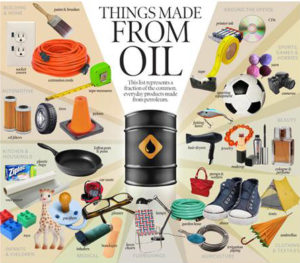Several times I have enjoyed speaking to school classes about various natural resources issues, and am invariably surprised at how poorly they understand where things come from. Water miraculously appears from the faucet, and gas from the pump, just as everything from milk and furniture to clothing and computers simply come from the store. They are mostly in the dark about the natural resources it takes to supply nearly everything around them.
It turns out that lack of understanding is about as common among adults as school children, as is evident in the current debates about ballot initiatives that would block oil and gas production. Even among people who understand that without oil there is no gasoline for their cars, there is a shocking ignorance about all the other uses of minerals to build a prosperous society.
 A few years ago a nationwide online survey revealed that 72 percent of the American public is unaware that plastic is made from oil. Americans rely on plastics in all aspects of their lives, yet most don’t know where plastic comes from, or where it goes. Forty percent of Americans think plastic will eventually biodegrade underground, in compost piles, landfills, or even in the ocean – actually plastic is not biodegradable at all. People also estimated that more than a third of all plastic is recycled, when in truth it’s less than ten percent.
A few years ago a nationwide online survey revealed that 72 percent of the American public is unaware that plastic is made from oil. Americans rely on plastics in all aspects of their lives, yet most don’t know where plastic comes from, or where it goes. Forty percent of Americans think plastic will eventually biodegrade underground, in compost piles, landfills, or even in the ocean – actually plastic is not biodegradable at all. People also estimated that more than a third of all plastic is recycled, when in truth it’s less than ten percent.
Actually, less than half of all the oil in America (47 percent) is used for gasoline. Barely 20 percent is used for heating oil and diesel fuel, and only 8 percent for aviation fuel. In fact, nearly 10 percent of U.S. oil consumption – almost 2 million barrels a day – is used to make plastic, and the rest goes into all sorts of other products we use every day.
Even our cars have only outer shells, engines, and frames made of steel, while tires, interiors, and all the rest are essentially made from oil. So are all the appliances in our kitchens, the products in our bathrooms, the ink to print newspapers, the carpet, drapes, upholstery, and paint in our homes, and the clothes on our backs.
If you imagine a better life and a better environment without oil and gas, you might be persuaded to vote to ban its production. But your life would not be what you expect. No more daily routine involving shampoo, toothpaste, combs, deodorant, hair color, nylons, or toilet seats. There would be no more business, or even entertainment, involving computers, cell phones, video games, or DVDs. You couldn’t even go back to paper, unless you want to start pounding it out of papyrus leaves again, or cutting your own trees and hauling the lumber with a team of oxen.
For entertainment, you might still have your favorite sports, although there would be no basketballs, football helmets, stadium seats, soccer balls, or tennis rackets. Nor could you watch any games on television. You would find no golf balls, bags, or grips, no skis, fishing poles, wading boots, or hunting vests. You could go back to clothes made entirely of cotton or wool, but you’d have to pick your own cotton, shear your own sheep, spin your own thread, and sew everything yourself, using needles made from bone.
Make no mistake – life before the industrial revolution was tough and people died young. Most grew their own food, with no farm-to-market trucking system and no paved roads. They had no defense against insects, or indeed against most illnesses. Today’s pharmaceutical miracles, often delivered in the form of small pills, rely heavily on petroleum byproducts, as do all the life-saving gadgets of modern hospitals. Very few people would knowingly choose to turn back that clock.
This reality hits close to home this fall, because Colorado voters must consider yet another ballot measure, once again masquerading as a set-back requirement, which would all but ban all oil and gas production in the State.
Intelligent voters, if convinced that oil is bad for the Earth (as claimed by the environmental industry), might decide simply to replace it with wind and solar power, at least in one State. But it isn’t simple – even wind turbines and solar panels require oil to manufacture and transport. So if voters in one State want to feel sanctimonious about ridding themselves of fossil fuels, they should know all they would really accomplish would be to export the jobs and tax base supported by that industry, while importing all of the products they will still want and need.
This column first appeared in the Grand Junction Daily Sentinel October 12, 2018.




Comments on this entry are closed.